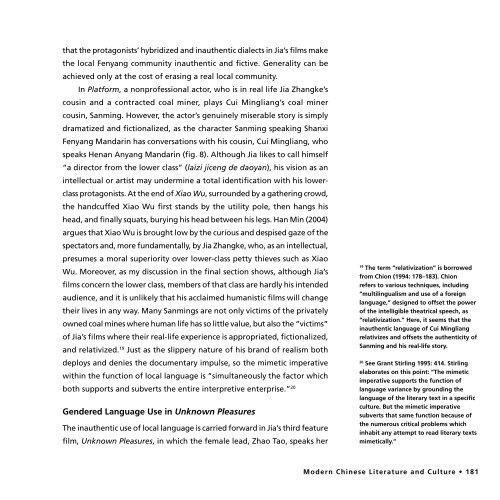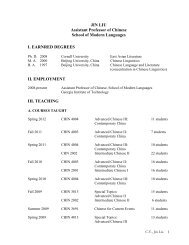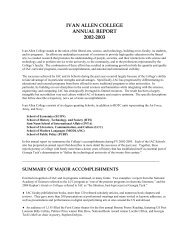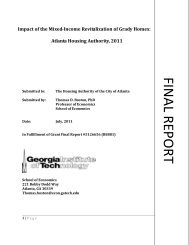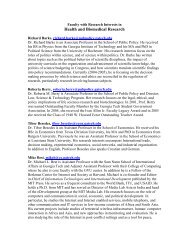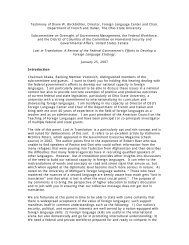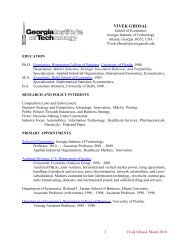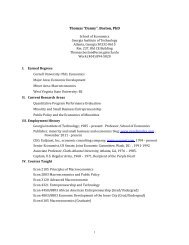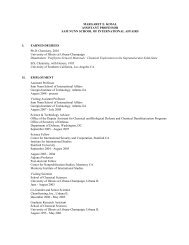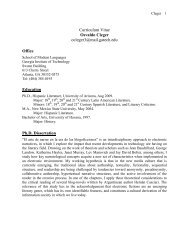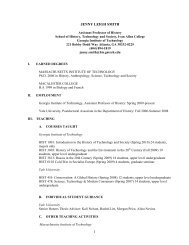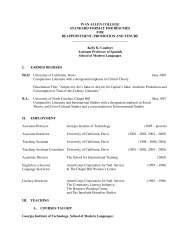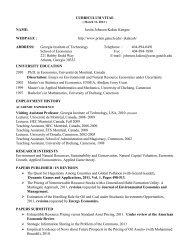Read this paper
Read this paper
Read this paper
Create successful ePaper yourself
Turn your PDF publications into a flip-book with our unique Google optimized e-Paper software.
that the protagonists’ hybridized and inauthentic dialects in Jia’s films make<br />
the local Fenyang community inauthentic and fictive. Generality can be<br />
achieved only at the cost of erasing a real local community.<br />
In Platform, a nonprofessional actor, who is in real life Jia Zhangke’s<br />
cousin and a contracted coal miner, plays Cui Mingliang’s coal miner<br />
cousin, Sanming. However, the actor’s genuinely miserable story is simply<br />
dramatized and fictionalized, as the character Sanming speaking Shanxi<br />
Fenyang Mandarin has conversations with his cousin, Cui Mingliang, who<br />
speaks Henan Anyang Mandarin (fig. 8). Although Jia likes to call himself<br />
“a director from the lower class” (laizi jiceng de daoyan), his vision as an<br />
intellectual or artist may undermine a total identification with his lowerclass<br />
protagonists. At the end of Xiao Wu, surrounded by a gathering crowd,<br />
the handcuffed Xiao Wu first stands by the utility pole, then hangs his<br />
head, and finally squats, burying his head between his legs. Han Min (2004)<br />
argues that Xiao Wu is brought low by the curious and despised gaze of the<br />
spectators and, more fundamentally, by Jia Zhangke, who, as an intellectual,<br />
presumes a moral superiority over lower-class petty thieves such as Xiao<br />
Wu. Moreover, as my discussion in the final section shows, although Jia’s<br />
films concern the lower class, members of that class are hardly his intended<br />
audience, and it is unlikely that his acclaimed humanistic films will change<br />
their lives in any way. Many Sanmings are not only victims of the privately<br />
owned coal mines where human life has so little value, but also the “victims”<br />
of Jia’s films where their real-life experience is appropriated, fictionalized,<br />
and relativized. 19 Just as the slippery nature of his brand of realism both<br />
deploys and denies the documentary impulse, so the mimetic imperative<br />
within the function of local language is “simultaneously the factor which<br />
both supports and subverts the entire interpretive enterprise.” 20<br />
Gendered Language Use in Unknown Pleasures<br />
The inauthentic use of local language is carried forward in Jia’s third feature<br />
film, Unknown Pleasures, in which the female lead, Zhao Tao, speaks her<br />
19<br />
The term “relativization” is borrowed<br />
from Chion (1994: 178–183). Chion<br />
refers to various techniques, including<br />
“multilingualism and use of a foreign<br />
language,” designed to offset the power<br />
of the intelligible theatrical speech, as<br />
“relativization.” Here, it seems that the<br />
inauthentic language of Cui Mingliang<br />
relativizes and offsets the authenticity of<br />
Sanming and his real-life story.<br />
20<br />
See Grant Stirling 1995: 414. Stirling<br />
elaborates on <strong>this</strong> point: “The mimetic<br />
imperative supports the function of<br />
language variance by grounding the<br />
language of the literary text in a specific<br />
culture. But the mimetic imperative<br />
subverts that same function because of<br />
the numerous critical problems which<br />
inhabit any attempt to read literary texts<br />
mimetically.”<br />
Modern Chinese Literature and Culture • 181<br />
MCLC 18.2.indd 181<br />
12/20/06 2:01:37 PM


